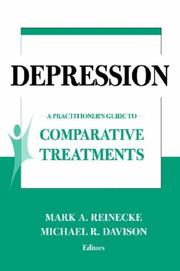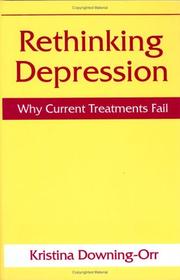| Listing 1 - 10 of 11 | << page >> |
Sort by
|

ISBN: 1280823364 9786610823369 0826121152 9780826121158 0826120938 Year: 2006 Publisher: New York Springer
Abstract | Keywords | Export | Availability | Bookmark
 Loading...
Loading...Choose an application
- Reference Manager
- EndNote
- RefWorks (Direct export to RefWorks)
Compares and contrasts alternative models of and treatment approaches to clinical depression. This book analyzes a case and provides: an overview of the treatment model; empirical evidence for both the model and treatment derived from it; and, treatment strategies and interventions, including termination issues and relapse prevention.
Depression, Mental -- Treatment. --- Depression, Mental. --- Depression. --- Depression, Mental --- Psychotherapy. --- Treatment.
Book
ISBN: 9781462507504 1462507506 9781462507559 Year: 2012 Publisher: New York Guilford Press
Abstract | Keywords | Export | Availability | Bookmark
 Loading...
Loading...Choose an application
- Reference Manager
- EndNote
- RefWorks (Direct export to RefWorks)
This acclaimed work, now in a new edition, has introduced tens of thousands of clinicians to mindfulness-based cognitive therapy (MBCT) for depression, an 8-week program with proven effectiveness. Step by step, the authors explain the'whys'and'how-tos'of conducting mindfulness practices and cognitive interventions that have been shown to bolster recovery from depression and prevent relapse. Clinicians are also guided to practice mindfulness themselves, an essential prerequisite to teaching others. Forty-five reproducible handouts are included. Purchasers get access to a companion website featuring downloadable audio recordings of the guided mindfulness practices (meditations and mindful movement), plus all of the reproducibles, ready to download and print in a convenient 8 1/2'x 11'size. A separate website for use by clients features the audio recordings only. New to This Edition •Incorporates a decade's worth of developments in MBCT clinical practice and training. •Chapters on additional treatment components: the pre-course interview and optional full-day retreat. •Chapters on self-compassion, the inquiry process, and the three-minute breathing space. •Findings from multiple studies of MBCT's effectiveness and underlying mechanisms. Includes studies of adaptations for treating psychological and physical health problems other than depression. •Audio files of the guided mindfulness practices, narrated by the authors, on two separate Web pages--one for professionals, together with the reproducibles, and one just for clients. See also the authors'related titles for clients: The Mindful Way through Depression demonstrates these proven strategies in a self-help format, with in-depth stories and examples. The Mindful Way Workbook gives clients additional, explicit support for building their mindfulness practice, following the sequence of the MBCT program. Plus, for professionals: Mindfulness-Based Cognitive Therapy with People at Risk of Suicide extends and refines MBCT for clients with suicidal depression.
Depression, Mental - Treatment --- Mindfulness-based cognitive therapy --- Depression, Mental --- Treatment
Book
ISBN: 0881676764 Year: 1991 Publisher: New York Raven Press
Abstract | Keywords | Export | Availability | Bookmark
 Loading...
Loading...Choose an application
- Reference Manager
- EndNote
- RefWorks (Direct export to RefWorks)

ISBN: 0674097297 Year: 1996 Publisher: Cambridge, Mass. ; London Harvard University Press
Abstract | Keywords | Export | Availability | Bookmark
 Loading...
Loading...Choose an application
- Reference Manager
- EndNote
- RefWorks (Direct export to RefWorks)
Book
ISBN: 0199885168 0190241926 128205354X 9786612053542 0199724695 9780199724697 9780195300000 0195300009 9780195371024 Year: 2009 Publisher: Oxford ; New York : Oxford University Press,
Abstract | Keywords | Export | Availability | Bookmark
 Loading...
Loading...Choose an application
- Reference Manager
- EndNote
- RefWorks (Direct export to RefWorks)
This therapist guide describes a cognitive-behavioral family intervention for obsessive compulsive disorder (OCD) in young children (ages 5-8). Both parents and children are taught ""tools"" to help them understand, manage and reduce OCD symptoms. Exposure with response prevention (E/RP) is the main component of treatment. In E/RP, the patient is exposed to the feared situation, and the usual response (i.e. the ritual or avoidance behavior) is prevented until anxiety descreases. The corresponding workbook for families reviews skills learned in therapy and includes forms and instructions for ho
Depression, Mental --- Cognitive therapy. --- Cognitive-behavior therapy --- Cognitive-behavioral therapy --- Cognitive psychotherapy --- Psychotherapy --- Treatment. --- Cognitive Therapy --- Depressive Disorder --- Treatment --- therapy --- methods --- Depression, Mental - Treatment --- Depressive Disorder - therapy --- Cognitive Therapy - methods

ISBN: 030645940X 1489901035 1489901019 9780306459405 Year: 1998 Publisher: New York (N.Y.) : Plenum press,
Abstract | Keywords | Export | Availability | Bookmark
 Loading...
Loading...Choose an application
- Reference Manager
- EndNote
- RefWorks (Direct export to RefWorks)
As both an academic and professional psychologist, my background is somewhat unique. Most psychologists either opt for the research route, where they study human behavior in the hope of generating insightful theories, or they choose to work clinically with clients and patients. The problems with these distinct pathways should seem appar ent. In their academic role, research psychologists study and gener ate numerous theories about people, both as individualsandas social beings. However, while their conclusions may provide the basis for therapeutic work, research psychologists are not clinicians. Con versely, clinical psychologists and other therapists are trained princi pally to work with clients and patients. While many clinicians carry out research projects, their time is mostly spent offering professional help to people. Although both roles serve to advance the science and practice of psychology, researchers in their ivory towers may find their abstract theories and conclusions are inapplicable in the "real world," whereas therapists might discover they work within pre scribed treatment frameworks without questioning the limits of these approaches. Because of my two professional roles, I have aimed to bridge this gap. Here, I have combined my experiences of researching and treat ing depression with the intentions of improving treatments and of encouraging better communication between the two psychologies. Kristina Downing-Orr Oxford, England V Acknowledgments Many people provided the inspiration for this book, and I will be etemally grateful for all their assistance.
Depression, Mental --- Psychotherapy --- Treatment --- Evaluation --- Failure --- Klinische psychologie --- Evaluation. --- Failure. --- psychotherapie --- psychotherapie. --- Clinical psychology. --- Psychiatry. --- Clinical Psychology. --- Medicine and psychology --- Mental health --- Psychology, Pathological --- Psychiatry --- Psychology, Applied --- Psychological tests --- Dejection --- Depression, Unipolar --- Depressive disorder --- Depressive psychoses --- Melancholia --- Mental depression --- Unipolar depression --- Affective disorders --- Neurasthenia --- Neuroses --- Manic-depressive illness --- Melancholy --- Sadness --- Depression, Mental - Treatment - Evaluation --- Psychotherapy - Failure
Book
ISBN: 1905832869 9786613228024 1283228025 1905832982 Year: 2011 Publisher: Abingdon, Oxford : Health Press,
Abstract | Keywords | Export | Availability | Bookmark
 Loading...
Loading...Choose an application
- Reference Manager
- EndNote
- RefWorks (Direct export to RefWorks)
Fast Facts: Depression provides concise and clear descriptions of the features, identification and management of depression.
Depression, Mental -- Treatment. --- Depression, Mental. --- Depressive Disorder -- diagnosis. --- Depressive Disorder -- therapy. --- Mood Disorders --- Mental Disorders --- Psychiatry and Psychology --- Depressive Disorder --- Dejection --- Depression, Unipolar --- Depressive disorder --- Depressive psychoses --- Melancholia --- Mental depression --- Unipolar depression --- Affective disorders --- Neurasthenia --- Neuroses --- Manic-depressive illness --- Melancholy --- Sadness --- Bipolar disorder

ISBN: 0805856692 1138149845 0203763998 1134999259 1299478158 9781134999255 9781299478152 9780203763995 9780805856699 9058674258 9789058674258 9781134999323 9781134999392 9781138149847 1134999321 Year: 2005 Publisher: Leuven Leuven University Press
Abstract | Keywords | Export | Availability | Bookmark
 Loading...
Loading...Choose an application
- Reference Manager
- EndNote
- RefWorks (Direct export to RefWorks)
Recent research indicates that depression, once believed to be relatively benign, is highly recurrent and does not respond well to treatment. The goal of this book is to facilitate the development of more encompassing theories and more effective treatments for this disabling disorder by fostering dialogue and enhancing the integration of work across the boundaries of separate fields.
Psychiatry --- Depression, Mental. --- Depression, Mental --- Treatment. --- Dejection --- Depression, Unipolar --- Depressive disorder --- Depressive psychoses --- Melancholia --- Mental depression --- Unipolar depression --- Affective disorders --- Neurasthenia --- Neuroses --- Manic-depressive illness --- Melancholy --- Sadness --- Treatment --- Academic collection --- #KVHB:Depressie --- 159.97 --- #PBIB:2005.2 --- #PBIB:gift 2005 --- 159.97 Psychologie van het abnormale--(Psychotherapie. Groepstherapie zie {615.851};Psychiatrie zie {616.89}) --- Psychologie van het abnormale--(Psychotherapie. Groepstherapie zie {615.851};Psychiatrie zie {616.89}) --- Klinische psychologie --- Specifieke problemen. --- Depression, Mental - Treatment --- Bipolar disorder
Book
ISBN: 4431547290 4431541020 4431541039 1283742055 Year: 2012 Publisher: Tokyo ; New York : Springer,
Abstract | Keywords | Export | Availability | Bookmark
 Loading...
Loading...Choose an application
- Reference Manager
- EndNote
- RefWorks (Direct export to RefWorks)
Social psychiatry is a multidisciplinary field that analyzes mechanisms of mental health issues comprehensively to contribute to society using the findings. These findings include biological, psychological, and social aspects and are based on psychiatry and connected with a wide variety of academic fields, including psychology, sociology, law, economics, and religious studies. Epidemiological research in psychiatry is a field of study in patients with psychiatric disorders that investigates causes in order to develop clinical applications of the results, and to create applications to health services plans for individuals and/or communities. Written by a leading authority on social psychiatry and psychiatric epidemiology who has been residing in Nagasaki for most of his life, and also worked as a head of the WHO Collaborating Centre for Research and Training in Mental Health, it describes not only outstanding epidemiological studies and mental support reports for atomic bomb sufferers but also international collaborative projects on schizophrenia, affective disorders, and common mental disorders. This book provides a valuable resource not only for physicians and researchers in the field of psychiatry and mental health but for all those who work in the field of mental health.
Depression, Mental -- Treatment -- Japan. --- Depressive Disorder -- psychology. --- Depressive Disorder -- therapy. --- Psychiatry -- trends. --- Psychotherapy -- Japan. --- Community psychiatry --- Community Health Services --- Far East --- Mental Health Services --- Psychiatry and Psychology --- Psychiatry --- Health Services Administration --- Public Health --- Health Services --- Asia --- Behavioral Disciplines and Activities --- Medicine --- Health Care --- Behavioral Sciences --- Health Occupations --- Health Care Facilities, Manpower, and Services --- Geographic Locations --- Disciplines and Occupations --- Geographicals --- Mental Disorders --- Community Mental Health Services --- Epidemiology --- Japan --- Organization and Administration --- Community Psychiatry --- Health & Biological Sciences --- Psychiatry - General --- Social psychiatry --- Psychiatry, Social --- Medicine. --- Neurosciences. --- Psychiatry. --- Epidemiology. --- Medicine & Public Health. --- Medicine/Public Health, general. --- Medicine and psychology --- Mental health --- Psychology, Pathological --- Clinical sociology --- Social medicine --- Social psychology --- Clinical sciences --- Medical profession --- Human biology --- Life sciences --- Medical sciences --- Pathology --- Physicians --- Neural sciences --- Neurological sciences --- Neuroscience --- Nervous system --- Diseases --- Public health --- Health Workforce
Book
ISBN: 1283227479 9786613227478 1400840384 9780691142050 069114205X 9780691142043 9781400840380 Year: 2011 Publisher: Princeton, NJ
Abstract | Keywords | Export | Availability | Bookmark
 Loading...
Loading...Choose an application
- Reference Manager
- EndNote
- RefWorks (Direct export to RefWorks)
Since the 1990s, suicide in recession-plagued Japan has soared, and rates of depression have both increased and received greater public attention. In a nation that has traditionally been uncomfortable addressing mental illness, what factors have allowed for the rising medicalization of depression and suicide? Investigating these profound changes from historical, clinical, and sociolegal perspectives, Depression in Japan explores how depression has become a national disease and entered the Japanese lexicon, how psychiatry has responded to the nation's ailing social order, and how, in a remarkable transformation, psychiatry has overcome the longstanding resistance to its intrusion in Japanese life. Questioning claims made by Japanese psychiatrists that depression hardly existed in premodern Japan, Junko Kitanaka shows that Japanese medicine did indeed have a language for talking about depression which was conceived of as an illness where psychological suffering was intimately connected to physiological and social distress. The author looks at how Japanese psychiatrists now use the discourse of depression to persuade patients that they are victims of biological and social forces beyond their control; analyzes how this language has been adopted in legal discourse surrounding'overwork suicide'; and considers how, in contrast to the West, this language curiously emphasizes the suffering of men rather than women. Examining patients'narratives, Kitanaka demonstrates how psychiatry constructs a gendering of depression, one that is closely tied to local politics and questions of legitimate social suffering. Drawing upon extensive research in psychiatric institutions in Tokyo and the surrounding region, Depression in Japan uncovers the emergence of psychiatry as a force for social transformation in Japan
Depression, Mental -- Treatment -- Japan. --- Depressive Disorder -- psychology. --- Japan. --- Patient Acceptance of Health Care. --- Psychotherapy -- Japan. --- Depression, Mental --- Psychotherapy --- Behavioral Sciences --- Self-Injurious Behavior --- Far East --- Personnel Management --- Medicine --- Social Problems --- Mood Disorders --- Attitude to Health --- Organization and Administration --- Mental Disorders --- Delivery of Health Care --- Health Occupations --- Sociology --- Behavioral Disciplines and Activities --- Asia --- Behavioral Symptoms --- Health Services Administration --- Psychiatry and Psychology --- Disciplines and Occupations --- Behavior --- Health Care Quality, Access, and Evaluation --- Geographic Locations --- Social Sciences --- Health Care --- Anthropology, Education, Sociology and Social Phenomena --- Behavior and Behavior Mechanisms --- Geographicals --- Psychiatry --- Suicide --- Japan --- Psychology --- Workload --- Depressive Disorder --- Patient Acceptance of Health Care --- Health & Biological Sciences --- Psychiatric Disorders, Individual --- Treatment --- Depression, Mental -- Treatment -- Japan --- Depressive Disorder -- psychology --- Psychotherapy -- Japan --- J7987 --- J4210 --- J4230 --- Community-Based Distribution --- Contraceptive Distribution --- Delivery of Healthcare --- Dental Care Delivery --- Distribution, Non-Clinical --- Distribution, Nonclinical --- Distributional Activities --- Healthcare --- Healthcare Delivery --- Healthcare Systems --- Non-Clinical Distribution --- Nonclinical Distribution --- Delivery of Dental Care --- Health Care Delivery --- Health Care Systems --- Activities, Distributional --- Activity, Distributional --- Care, Health --- Community Based Distribution --- Community-Based Distributions --- Contraceptive Distributions --- Deliveries, Healthcare --- Delivery, Dental Care --- Delivery, Health Care --- Delivery, Healthcare --- Distribution, Community-Based --- Distribution, Contraceptive --- Distribution, Non Clinical --- Distributional Activity --- Distributions, Community-Based --- Distributions, Contraceptive --- Distributions, Non-Clinical --- Distributions, Nonclinical --- Health Care System --- Healthcare Deliveries --- Healthcare System --- Non Clinical Distribution --- Non-Clinical Distributions --- Nonclinical Distributions --- System, Health Care --- System, Healthcare --- Systems, Health Care --- Systems, Healthcare --- Science, Social --- Sciences, Social --- Social Science --- Healthcare Quality, Access, and Evaluation --- Acceptance Process --- Acceptance Processes --- Behaviors --- Process, Acceptance --- Processes, Acceptance --- Administration, Health Services --- Health Services --- Behavioral Symptom --- Symptom, Behavioral --- Symptoms, Behavioral --- General Social Development and Population --- Health Professions --- Health Occupation --- Health Profession --- Profession, Health --- Professions, Health --- Occupations --- Behavior Disorders --- Diagnosis, Psychiatric --- Mental Disorders, Severe --- Psychiatric Diagnosis --- Psychiatric Diseases --- Psychiatric Disorders --- Psychiatric Illness --- Mental Disorder --- Mental Disorder, Severe --- Psychiatric Disease --- Psychiatric Disorder --- Psychiatric Illnesses --- Severe Mental Disorder --- Severe Mental Disorders --- Mentally Ill Persons --- Client-Staff Ratio --- Client Staff Ratio --- Client-Staff Ratios --- Management, Personnel --- Ratio, Client-Staff --- Ratios, Client-Staff --- Deliberate Self-Harm --- Non-Suicidal Self Injury --- Nonsuicidal Self Injury --- Self-Injury --- Self-Destructive Behavior --- Behavior, Self-Destructive --- Behavior, Self-Injurious --- Behaviors, Self-Destructive --- Behaviors, Self-Injurious --- Deliberate Self Harm --- Non Suicidal Self Injury --- Non-Suicidal Self Injuries --- Nonsuicidal Self Injuries --- Self Destructive Behavior --- Self Injuries, Non-Suicidal --- Self Injuries, Nonsuicidal --- Self Injurious Behavior --- Self Injury --- Self Injury, Non-Suicidal --- Self Injury, Nonsuicidal --- Self-Destructive Behaviors --- Self-Harm, Deliberate --- Self-Injuries --- Self-Injurious Behaviors --- Body Modification, Non-Therapeutic --- Proxemics --- Behavioral Science --- Proxemic --- Science, Behavioral --- Sciences, Behavioral --- Dejection --- Depression, Unipolar --- Depressive disorder --- Depressive psychoses --- Melancholia --- Mental depression --- Unipolar depression --- Affective disorders --- Neurasthenia --- Neuroses --- Manic-depressive illness --- Melancholy --- Sadness --- Suicides --- Death --- Psychiatrists --- Psychiatrist --- Administration and Organization --- Administrative Technics --- Administrative Techniques --- Coordination, Administrative --- Logistics --- Supervision --- Technics, Administrative --- Techniques, Administrative --- Administration --- Administrative Coordination --- Administrative Technic --- Administrative Technique --- Technic, Administrative --- Technique, Administrative --- Health Attitude --- Attitude, Health --- Attitudes, Health --- Health Attitudes --- Health, Attitude to --- Public Opinion --- Affective Disorders --- Affective Disorder --- Disorder, Affective --- Disorder, Mood --- Disorders, Affective --- Disorders, Mood --- Mood Disorder --- Labor Exploitation --- Social Exploitation --- Exploitation, Labor --- Exploitation, Social --- Exploitations, Labor --- Problem, Social --- Problems, Social --- Social Problem --- Medical Specialities --- Medical Specialties --- Medical Specialty --- Specialities, Medical --- Specialties, Medical --- Specialty, Medical --- Medical Speciality --- Speciality, Medical --- Health Workforce --- Acceptability of Healthcare --- Acceptors of Health Care --- Health Care Utilization --- Nonacceptors of Health Care --- Patient Acceptance of Healthcare --- Acceptability of Health Care --- Health Care Seeking Behavior --- Care Acceptor, Health --- Care Acceptors, Health --- Care Nonacceptor, Health --- Care Nonacceptors, Health --- Health Care Acceptability --- Health Care Acceptor --- Health Care Acceptors --- Health Care Nonacceptor --- Health Care Nonacceptors --- Healthcare Acceptabilities --- Healthcare Acceptability --- Healthcare Patient Acceptance --- Healthcare Patient Acceptances --- Utilization, Health Care --- Patient Satisfaction --- Depression, Endogenous --- Depression, Neurotic --- Depressive Syndrome --- Neurosis, Depressive --- Unipolar Depression --- Depressions, Endogenous --- Depressions, Neurotic --- Depressions, Unipolar --- Depressive Disorders --- Depressive Neuroses --- Depressive Neurosis --- Depressive Syndromes --- Disorder, Depressive --- Disorders, Depressive --- Endogenous Depression --- Endogenous Depressions --- Melancholias --- Neuroses, Depressive --- Neurotic Depression --- Neurotic Depressions --- Syndrome, Depressive --- Syndromes, Depressive --- Unipolar Depressions --- Employee Work Load --- Staff Work Load --- Work Load --- Employee Workload --- Staff Workload --- Employee Work Loads --- Employee Workloads --- Staff Work Loads --- Staff Workloads --- Work Load, Employee --- Work Load, Staff --- Work Loads --- Work Loads, Employee --- Work Loads, Staff --- Workload, Employee --- Workload, Staff --- Workloads --- Workloads, Employee --- Workloads, Staff --- Task Performance and Analysis --- Factors, Psychological --- Psychological Factors --- Psychological Side Effects --- Psychologists --- Psychosocial Factors --- Side Effects, Psychological --- Factor, Psychological --- Factor, Psychosocial --- Factors, Psychosocial --- Psychological Factor --- Psychological Side Effect --- Psychologist --- Psychosocial Factor --- Side Effect, Psychological --- Japan: Science and technology -- medical science -- psychotherapy, faith cure --- Japan: Sociology and anthropology -- social policy and pathology --- Japan: Sociology and anthropology -- social pathology and degeneration --- organization & administration --- E-books --- Psychology. --- Therapy. --- trends. --- psychology. --- Behavior And Behavior Mechanism --- Mental Illness --- Illness, Mental --- Mental Illnesses --- Intentional Self Harm --- Intentional Self Injury --- Self Harm --- Harm, Self --- Intentional Self Injuries --- Self Harm, Intentional --- Self Injury, Intentional --- Depression, Mental - Treatment - Japan --- Psychotherapy - Japan --- Bipolar disorder
| Listing 1 - 10 of 11 | << page >> |
Sort by
|

 Search
Search Feedback
Feedback About UniCat
About UniCat  Help
Help News
News